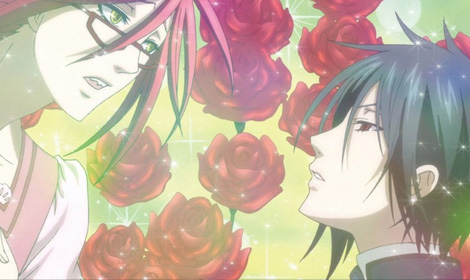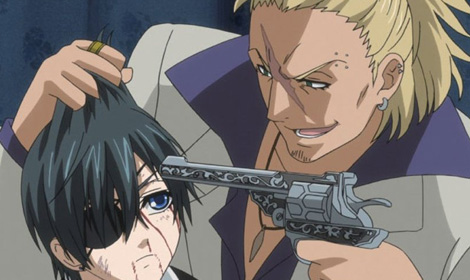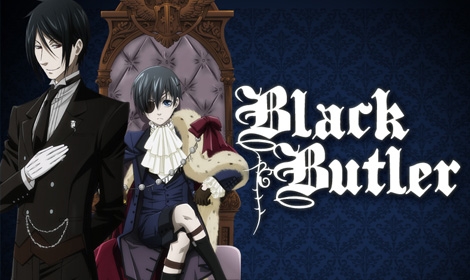Demons, demon wolves, grim reapers, Victorian England, murder, and melancholy: these are what you’ll get in droves with Black Butler. Heir to the Phantomive estate and toy company, Ciel Phantomhive is a young boy who lost his parents years ago and formed a pact with a demon cum butler, Sebastian Michaelis, to avenge them. When Sebastian finally kills those responsible for murdering the late Mr. and Mrs. Phantomhive, he will consume Ciel’s soul. Trust me, you won’t be able to explain this show to your friends without using the word "melancholy."
It’s easy to assume that Ciel Phantomhive is nothing more than a selfish, spoiled, delicate young lord with a serious attitude problem, and you’d be mostly right. While normally this would send me into hair-ripping raves, the kid’s dealing with a lot and that becomes increasingly apparent as the series goes on. Forgive his decadent attire and surly demeanor, young Ciel not only bears the weight of an entire noble family on his lonely shoulders, he constantly hears the dying screams of his ancestors, is responsible for dealing with dangerous crimes in all of England, and the closest thing he has to a friend is his soul-hungry demon butler. I wouldn’t expect an adult to deal with any of this terribly well, let alone a young boy with no mentors and few friends.
What the series explores over twenty four episodes is that Ciel is broken; so much so that he’s dead on the inside. Writing melancholic characters can be a tricky thing, but I did appreciate that, while he doesn’t care about himself, he does care about other people and maintains a sense of right and wrong. Despite his flaws, the only people he’s willing to put into truly dangerous situations are himself and Sebastian. I was never convinced that his motivations wholly excuse bartering his soul to a demon, but there is a nonstop flow of tragedy in Black Butler that had me feeling sorry for the boy by the end of the series; I didn’t feel that way because of his struggles or ultimate destiny, but because he simply didn’t care about either. Perhaps the most self-defining thing Ciel ever says is, “If I let go of hatred, then the person I’ve been since that day disappears.” He’s damned, hollow, and angry and he likes it that way.
Sebastian is by far one of the most likeable characters in the show. He’s so smooth talking, humble, and good at everything that it’s hard to remember that he is a demon and eats souls. The series clearly plays with our conceptions of what constitutes good and evil as Sebastian is the only person Ciel can fully rely upon, although even that comes into question for an episode. Since he does everything from tie Ciel’s shoes to cook incredible meals to fight supernatural creatures, without breaking a sweat, he may seem like the type of butler you might fantasize about having. Just remember, though, that Ciel has paid the ultimate price for this kind of service, and Sebastian subtly hints throughout the series that the only reason Ciel warrants as much is because he is unique, not just another corrupted soul.

The four servants of the Phantomhive manor, Finnian Mey-Rin Bardroy and Tanaka, are your typical plucky group of earnest misfits, or so they seem. They serve as Black Butler’s comedic relief even when they’re stuck in fairly serious situations; their perpetual incompetence and excitability serve as counterweights to Ciel’s moroseness and Sebastian’s “one hell of a butler” routine. Since each of them are almost entirely defined by this role, they were annoying in the first few episodes but eventually grew on me as their characters developed. In the final few episodes their pasts are revealed and it becomes apparent that they each, perhaps save one, have very good reasons for being the way they are.
The rest of Black Butler’s cast is composed of traitors, deceivers, and generally horrible or dysfunctional people. Although there are a handful of humans and supernatural beings that can be looked at as the good guys, they’re usually flawed, powerless, and don’t make much of an impact outside of their thematic importance. Everyone else is either a meandering victim or someone you should feel bad about liking, but really don’t. The characters that are morally dark grey get the most face time in this series, minus the Phantomhive crew. However, the show does a great job of delicately balancing the depressing, the funny, and the righteous.
The one thing that turns an okay story into a great one is providing believable motivations for everyone from the most normal servant to the most insane monster, and Black Butler definitely impressed me with the majority of its characters. Even though there wasn’t too much time spent developing every characters background, they maximize time spent on doing just this with poignant and timely flashbacks coupled with dramatic expository. We even get a little peak into Sebastian’s inner self, which is nice. The only thing that really frustrated me in terms of character development was the lack of development for the series’ main villain. Although we don’t even know who that is until about two-thirds into the series, we never find out just what motivates them to cause all the chaos and mayhem that they do.

Considering this anime takes place in Victorian England, the English voice acting was actually, to me, more enjoyable than the Japanese. That isn’t to say that the Japanese voice actors did a poor job, they fit the characters very well, but the English voices were simply more immersive. While not all of the voice actors were specifically trained to perform English accents, everyone’s performance was either good or great. FUNimation clearly aimed to keep the dialogue and presentation true to the time period over the original Japanese script. While some anime fans might find this disgusting, there were so many Japanese mannerisms in the original that it felt out of place. Case in point, one of the characters is infatuated with Sebastian and, in the Japanese dialogue, calls him “Sebas-chan” to show his affection. While this is fairly clever, it’s not a joke one would have likely heard in Victorian England. The name was changed to “Bassy” in the English version, which, while not as witty, still provides the same level of cutesy endearment. Regardless of how you feel, both English and Japanese versions are available for your consideration.
Despite everything that the show does well, make no mistake, this is an anime that can be summed up in two words for the casual viewer: yaoi bait. The Victorian setting is definitely very interesting and there are actually a number of accurate, or mostly accurate, historical references, but it’s also currently one of the most fetishized eras in Japanese and Western culture. To its credit, the clothes are mostly period accurate. What does become excessive is the frequent titillating male on male interactions. Unless you enjoy that type of thing, it might wear on you after a few episodes. While I don’t disparage the show for targeting a more specific audience, it’s not for everyone.
All things considered, Black Butler is an all around great anime to watch if you’re looking for an involving story, a little bit of action, and don’t mind that it’s mostly geared towards yaoi fans. Some aspects of the series felt excessive, but that’s only because they are, again, catered to a specific audience. Even though most characters don’t change much, I was impressed with how they were explained, explored, and tested. The show ends on a fairly conclusive note, but the details are never developed which explains why season two is out and about. Even if Black Butler had ended with season one, I would say that it finished on a satisfying note.
![]()
Things I loved:
+ Excellent character depth and emotional balance.
+ Memorable dialogue between characters, including one specific example:
“Sebastian, stay with me till I fall asleep.”
“Goodness, are you displaying weakness in front of me now?”
“Just a simple order.”
“I will stay here. I am by your side forever, master. Until the end.”
-Ciel, Sebastian
Things I hated:
-Yaoi-tastic. (I know, I know, some of you would consider that a good thing, but it narrows the target audience!)
-Focuses primarily on melodramatic themes.
Disclosure: A review copy was provided by the distributor, Images copyrighted:FUNimation/A-1 Pictures

